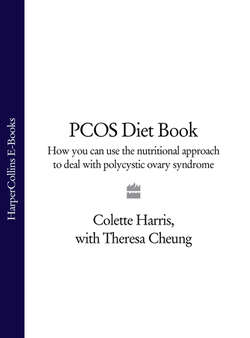Читать книгу PCOS Diet Book: How you can use the nutritional approach to deal with polycystic ovary syndrome - Theresa Cheung - Страница 14
GETTING WHAT YOU NEED
ОглавлениеFood isn’t just important to women with PCOS because it helps with insulin resistance and gives you back a feeling of control over your health. Food is also vital because it contains essential nutrients which the human body needs in order to function properly.
Nutritional deficiencies – when you don’t get enough of all the essential vitamins, minerals and other nutrients you need to keep your body running efficiently – can be caused by diet or outside forces like stress and pollution, which make your body use up more nutrients in order to protect itself. Nutritional deficiencies can disturb the whole intricate system of your body.
As well as having a role in the struggle against diseases such as cancer, arthritis and heart disease, diet can also help combat infertility, stress, insomnia and conditions like PMS.
The aim of nutritional therapy tailored for PCOS, and the role of a nutritional therapist – someone trained to see food and nutritional supplements as medicine, and help you to use them to correct imbalances in the body – would be to reduce insulin levels by lowering blood-sugar and other triggers of insulin production, such as stimulants like coffee and stress. Eating the right kinds of food can provide the body with the proper nutrients so it can correct the underlying hormonal imbalances which lie at the root of PCOS, and tackle specific symptoms such as sugar cravings, acne, hair loss, irregular periods and depression.
For instance, avoiding saturated fat and high-sugar foods, and increasing fibre intake, can help to reduce androgen levels and ease the symptoms which are triggered when male hormones are out of balance.
Many women with PCOS also have to deal with ‘unopposed’ oestrogen, which occurs when no ovulation takes place in a menstrual cycle, so that there is no surge of progesterone in the second half of the cycle to balance out the normal levels of oestrogen. Unopposed oestrogen can cause symptoms such as hot sweats and dizziness. Dietary changes such as avoiding junk foods and unhealthy carbohydrates and ensuring an adequate intake of essential fatty acids and healthy carbohydrates would aim to restore the correct balance of oestrogen, progesterone and androgen. (See Chapter 2 for descriptions of healthy and unhealthy carbohydrates.)
According to clinical nutritionist Conner Middleman Whitney, who has studied and documented the effects of nutritional therapy on PCOS via a three-month internet study involving dietary changes and nutritional supplements, ‘More work needs to be done into the link between nutrition and PCOS. However, for women seeking to overcome the many symptoms associated with PCOS, I strongly believe that nutritional therapy can offer powerful support.’10
